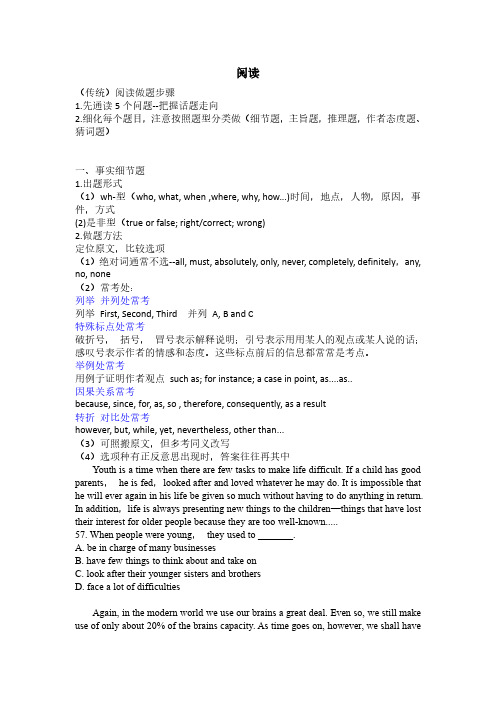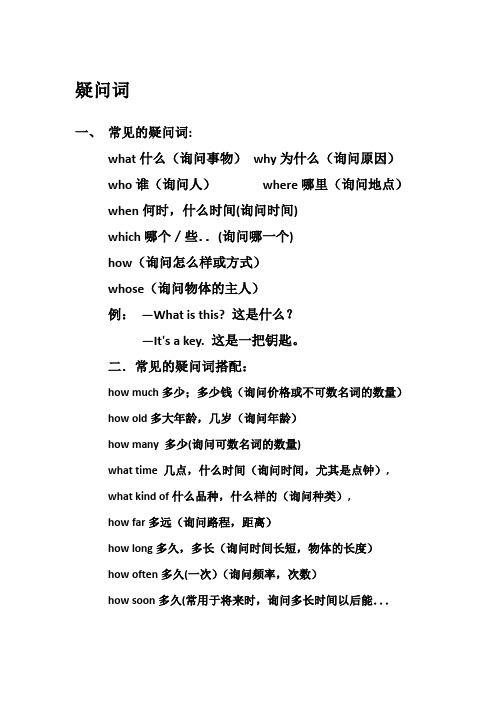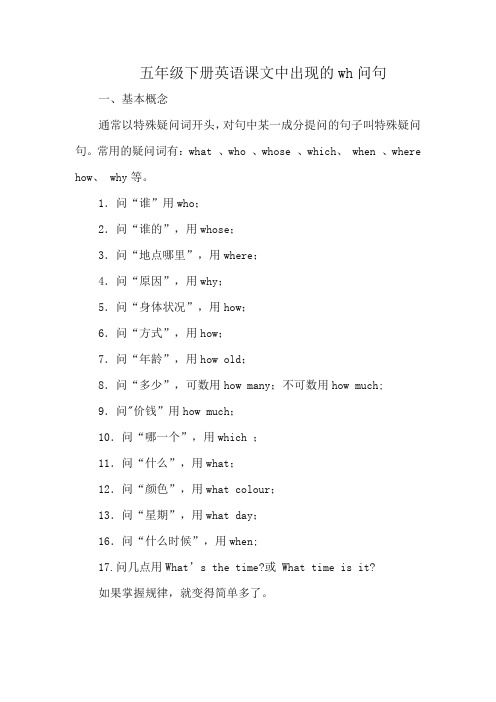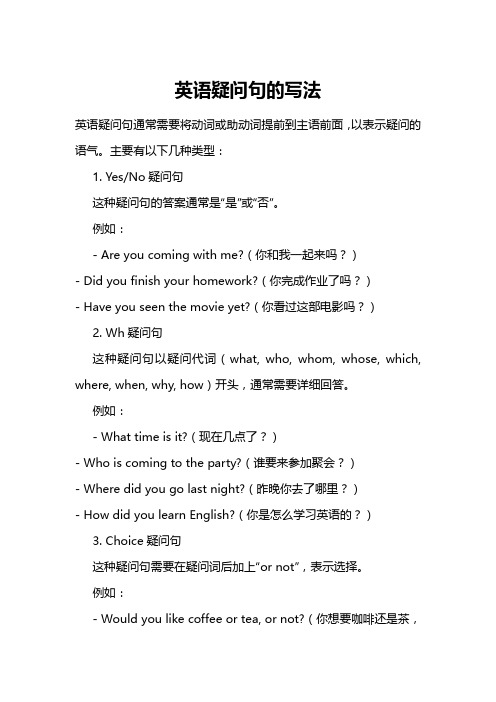Wh- (where, when, who, what time)-How often question
英语专升本阅读完型填空讲义

阅读(传统)阅读做题步骤1.先通读5个问题--把握话题走向2.细化每个题目,注意按照题型分类做(细节题,主旨题,推理题,作者态度题、猜词题)一、事实细节题1.出题形式(1)wh-型(who,what,when,where,why,how...)时间,地点,人物,原因,事件,方式(2)是非型(true or false;right/correct;wrong)2.做题方法定位原文,比较选项(1)绝对词通常不选--all,must,absolutely,only,never,completely,definitely,any, no,none(2)常考处:列举并列处常考列举First,Second,Third并列A,B and C特殊标点处常考破折号,括号,冒号表示解释说明;引号表示用用某人的观点或某人说的话;感叹号表示作者的情感和态度。
这些标点前后的信息都常常是考点。
举例处常考用例子证明作者观点such as;for instance;a case in point,as....as..因果关系常考because,since,for,as,so,therefore,consequently,as a result转折对比处常考however,but,while,yet,nevertheless,other than...(3)可照搬原文,但多考同义改写(4)选项种有正反意思出现时,答案往往再其中Youth is a time when there are few tasks to make life difficult.If a child has good parents,he is fed,looked after and loved whatever he may do.It is impossible that he will ever again in his life be given so much without having to do anything in return. In addition,life is always presenting new things to the children—things that have lost their interest for older people because they are too well-known.....57.When people were young,they used to_______.A.be in charge of many businessesB.have few things to think about and take onC.look after their younger sisters and brothersD.face a lot of difficultiesAgain,in the modern world we use our brains a great deal.Even so,we still make use of only about20%of the brains capacity.As time goes on,however,we shall haveto use our brains more and more,and eventually we shall need larger ones.This is likely to bring about a physical change too—the head,in particular the forehead,will grow larger.53.Man’s forehead will grow larger because_______.A.he will make use of only about20%of the brain’s capacityB.the other80%of his brain will grow in due timeC.he had rather narrow forehead a few hundred years agoD.he will have to use his brain more and more as time goes on二.主旨大意题1.出题形式文章大意类What is the passage mainly about?What’s the main idea of this passage?What’s the best title for the passage?What’s the writer’s purpose in writing the passage?The writer of the passage wants to tell us that2.做题方法(1)概括法(2)高频词法(2)首尾呼应法(首段首句+尾段首句)Procrastination(犹豫不决)is a disease of the mind.A scientific study in recent years has shown that it is a close relative of sadness and attention disorder;that procrastinators tend to be the result of low self-confidence and are likely to experience anxiety.41.What is the main topic of this passage?A.Don’t hesitate to give up smoking.B.Don’t regard depression as not important.C.Delay can be a sign of illness.D.Don’t work too hard to stay healthy.三、推理判断题1.出题形式(1)We can infer from the(first/last)passage that________.(2)The passage/author implies/suggests that______.2.做题方法(1)不选照搬原文选项(2)判断有据,推论有理,忠实原文。
英语疑问词what-how-who-why-where-when的用法

英语疑问词(8wh)的用法what, who, why, where, when ,which,whose, how一、what“什么”用来问是什么,叫什么,做什么等。
1. What’s your name?你叫什么名字?2. What’s your father ? 你爸爸是干什么的?3.What is in your box ? 你的盒子里是什么?What time“什么时间”,用来问时间。
What time is it? 几点了?What colour“什么颜色“,用来问颜色。
1.What colour is your bag? 你的书包是什么颜色?2.What colour is your book? 你的书本是什么颜色?What about“怎么样”,用来征求意见或询问感受等,大多用于承接上面的同样问题。
1.What bout this pair of shoes?这双鞋子怎么样?2.What about you?你呢?3.What about your dad?你爸爸呢?What day“星期几”,用来问星期几。
1.What day is it today?今天星期几?2. What day was yesterday? 昨天星期几?What date“什么日期”,问具体的日期。
1.What’s the date today? 今天是几号?What …for“为何目的”,用来问目的,在一定情况下只可以与why 互换。
1.What did you buy that for? 你为什么要买那个?2.Why didi you buy it?二、when“什么时候”,用来问时间。
1.When do you get up?你什么时候起床?2. When did you go there? 你什么时候去的那里?三、where“哪里”,用来问地点。
1. Where is my ruler ?我的尺子在哪里?2.Where are you from? 你是哪里人?3. Where are you going to ? 你打算去哪里?四、which“哪一个”,用来问具体的哪一个。
英语疑问词what-how-who-why-where-when的用法(汇编)

英语疑问词(8wh)的用法what, who, why, where, when ,which,whose, how一、what“什么”用来问是什么,叫什么,做什么等。
1. What’s your name?你叫什么名字?2. What’s your father ? 你爸爸是干什么的?3.What is in your box ? 你的盒子里是什么?What time“什么时间”,用来问时间。
What time is it? 几点了?What colour“什么颜色“,用来问颜色。
1.What colour is your bag? 你的书包是什么颜色?2.What colour is your book? 你的书本是什么颜色?What about“怎么样”,用来征求意见或询问感受等,大多用于承接上面的同样问题。
1.What bout this pair of shoes?这双鞋子怎么样?2.What about you?你呢?3.What about your dad?你爸爸呢?What day“星期几”,用来问星期几。
1.What day is it today?今天星期几?2. What day was yesterday? 昨天星期几?What date“什么日期”,问具体的日期。
1.What’s the date today? 今天是几号?What …for“为何目的”,用来问目的,在一定情况下只可以与why 互换。
1.What did you buy that for? 你为什么要买那个?2.Why didi you buy it?二、when“什么时候”,用来问时间。
1.When do you get up?你什么时候起床?2. When did you go there? 你什么时候去的那里?三、where“哪里”,用来问地点。
1. Where is my ruler ?我的尺子在哪里?2.Where are you from? 你是哪里人?3. Where are you going to ? 你打算去哪里?四、which“哪一个”,用来问具体的哪一个。
疑问词

疑问词一、常见的疑问词:what什么(询问事物)why为什么(询问原因)who谁(询问人)where哪里(询问地点)when何时,什么时间(询问时间)which哪个/些..(询问哪一个)how(询问怎么样或方式)whose(询问物体的主人)例:—What is this? 这是什么?—It's a key. 这是一把钥匙。
二.常见的疑问词搭配:how much多少;多少钱(询问价格或不可数名词的数量)how old多大年龄,几岁(询问年龄)how many 多少(询问可数名词的数量)what time 几点,什么时间(询问时间,尤其是点钟),what kind of什么品种,什么样的(询问种类),how far多远(询问路程,距离)how long多久,多长(询问时间长短,物体的长度)how often多久(一次)(询问频率,次数)how soon多久(常用于将来时,询问多长时间以后能...-How soon can he get here?-He can get here in half an hour.—How much is it? 这个多少钱?—It's twenty dollars. 二十美元。
—What kind of movies do you like? 你喜欢哪一类型的影?—I like action movies. 我喜欢动作片。
以疑问词who,what,when,which,why,where,whose,how等引导的问句都叫特殊疑问句,也叫疑问词疑问句有时还被称为wh-问句(wh-question)。
结构一般为:疑问词+助动词+主语+主动词等。
作为疑问词的what可以用来询问名字、国籍、工作、颜色、型号等。
例如以下几个问句:What make is this car? 这辆小汽车是什么牌子的?What nationality are you? 你是哪国人?What is your job? 你的工作是干什么?What colour is it? 它是什么颜色的?What size is this skirt? 这条裙子是多大号的?二英语中,疑问词有哪些?用疑问词引导的疑问句叫做特殊疑问句。
WH疑问句

WH疑问句,祈使句,感叹句WH问句:疑问词(When,where,who,what,which 及how.)疑问代词:what,which,who,whose.疑问副词;when,where,why,how疑问形容词:what,whose,which. +名词,what time,whose bike,which one1.疑问代词:疑问词做主语疑问词+动词Who is cooking in the kitchen? Kate and Mary are.*疑问词当主语的时候,视为单数,后面要接单数动词(状况不明,视为单数)疑问词做补语疑问词+be动词+主语如:whose are these toys?Who is that tall boy?疑问词当宾语疑问词+助动词+主语+V如;which do you want to take?2疑问副词的用法疑问副词+be动词+主语疑问副词+助动词+主语+动词原形。
如;When are you leaving America?Where do you come from?Why is he absent?How did you come here?3.疑问形容词的用法疑问词+名词+be动词+主语疑问词+名词+ 助动词+主语+动词原形如:whose house is this=whose is this house.Which one do you like best?How,what 的问句What day is it? It is SundayWhat date is it? It’s Octorber 23.How old will you be? I’ll be ten.How tall are you? I am 160 centimeters tall.How high is the Mt.Everest? It’s 8848 meters high.How many cups of coffee do you drink?How much coffee do you drink?How long will you stay in Beijing? For about two weeks.How long is the rope? It is two meters long.How often do you play tennis. Once a week.How far is it from here to the post office. It’s about ten minutes’ walk.(walk 做名词表示路程)。
五年级下册英语课文中出现的wh问句

五年级下册英语课文中出现的wh问句一、基本概念通常以特殊疑问词开头,对句中某一成分提问的句子叫特殊疑问句。
常用的疑问词有:what 、who 、whose 、which、 when 、where how、 why等。
1.问“谁”用who;2.问“谁的”,用whose;3.问“地点哪里”,用where;4.问“原因”,用why;5.问“身体状况”,用how;6.问“方式”,用how;7.问“年龄”,用how old;8.问“多少”,可数用how many;不可数用how much;9.问"价钱”用how much;10.问“哪一个”,用which ;11.问“什么”,用what;12.问“颜色”,用what colour;13.问“星期”,用what day;16.问“什么时候”,用when;17.问几点用What’s the time?或 What time is it?如果掌握规律,就变得简单多了。
总结一条就是:“特殊疑问词+一般疑问句”,但特殊疑问词的确定要根据划线内容确定,在小学阶段常出现的有以下几种:1.划线部分是“事或物”,特殊疑问词用whatEg: This is a bag. ---What is this?We often play football on Sundays .---What do you often do on Sundays ?2、划线部分是“人”,特殊疑问词用whoEg:She is my sister. ---Who is she ?3、划线部分是“地点”,特殊疑问词用whereEg:The apple is on the desk.---Where is the apple ?4、划线部分是“时间”,特殊疑问词用what time或whenEg:It's six thirty . ---What time is it ?I usually get up at six forty .--- When do you usually get up?5、划线部分是“年龄”,特殊疑问词用how oldEg:I am twelve . ---How old are you?My mother is thirty- two . ---How old is your mother ?6、划线部分是“职业”,特殊疑问词用whatEg:Tom is a worker. ---What is Tom?/What do you do ?7、划线部分是“颜色”,特殊疑问词用what colourEg:My hat is blue . ---What colour is your hat?8、划线部分是“数量”,特殊疑问词用how many或how muchEg:I can see five birds in the tree.---How many birds can you see ?There is some tea in the cup.---How much tea is there in the cup ?9、划线部分是“多少钱”,特殊疑问词用how muchEg:This book is ten yuan . ---How much is this book ?10、划线部分是“形容词性物主代词或名词性物主代词”,特殊疑问词用whoseEg:That is my shirt . ---Whose shirt is that ?11、对距离提问:The factory is two kilometers from here.--- How far is the factory from here?12、对长度提问:The ruler is one metre long.---- How long is the ruler?13、对星期提问:Today is Monday.---- What day is it today?It’s May 2 today. --- What’s the date today?14、对种类(后置定语)提问:I want the cakes with nuts in them .------What kind of cakes do you want?二、小学英语对划线部分提问答题口诀:一代(用疑问词代替划线部分),二移(把疑问词移至句首),三找(找is , are ,can,would)抄在疑问词后,没有则用do,does(用于主语是第三人称),出现I am 则直接改为Are you),四抄(照抄其它部分)五改(出现some,要考虑是否改为any。
英语疑问句用法whathowwhowhywherewhenwhichwhose的用法

英语疑问句用法:what how who why where whe n which whose谁的什么怎样谁为什么哪里什么时候哪一个一、what 什么用来问是什么,叫什么,做什么等1. Whaf s your name 你叫什么名字2. What' s your father 你爸爸是干什么的is in your box 你的盒子里是什么What time 什么时间用来问时间What time is it 几点了What time is it now 现在几点了What colour 什么颜色用来问颜色1. waht colour is your bag 你的书包是什么颜色2. what colour is your book 你的书本是什么颜色What about 怎么样用来征求意见或询问感受等,大多用于承接上面的同样问题1. what bout this pair of shoes 这双鞋子怎么样2. what about you 你呢3. what about your dad 你爸爸呢What day 星期几用来问星期几1. what day is it today 今天星期几2. what day was yesterday 昨天星期几What date 什么日期问具体的日期1. Wha' s the date today 今天是几号2. what date is tomorrow 明天是几号What…for 为何目的用来问目的,在一定情况下只可以与why互换What did you buy that for 你为什么要买那个二、when 什么时候用来问时间1. whe n do you get up 你什么时候起床2. whe n did you go there 你什么时候去的那里三、where 哪里用来问地点1. where is my ruler 我的尺子在哪里2. where are you from 你是哪里人3. where are you going to 你打算去哪里四、which 哪一个用来问具体的哪一个1. which seas on do you like best 你最喜欢哪个季节2. w hich class are you in 你在哪一个班3. w hich one is my pen 哪一个是我的钢笔五、who 谁用来问人物是谁1. w ho is that boy那个男孩是谁2. who are you going to with 你打算和谁一起去3. Who is that pretty lady 那个漂亮的女士是谁六、whose 谁的用来问东西是谁的1. whose bag is this 这是谁的包2. w hose bike is yellow 谁的自行车是黄色的七、why 为什么用来问原因1. why do you like spri ng 你为什么喜欢春天2. why did you go there 你为什么去那里八、how 怎么样用来询问身体等状况1. how are you 你好吗2. how is your mother 你妈妈好吗How old 几岁用来问年龄1. how old are you 你几岁了2. how old is your father 你爸爸多大了How long 多长用来问长度1. how long are your legs 你的腿多长2. how long is your pen cil 你的铅笔多长How big 多大用来问物体的大小1. How big is your bedroom 你的卧室多大How tall 多高用来问高度1. How tall is your brother 你弟弟有多咼How heavy 多重用来问重量1. How heavy are you 你有多重2. How heavy is this box 这个箱子有多重How far多远用来问路程1. How far can you dive un der the water 在水下你能游多远2. How far is it from here 从这儿去有多远How many 多少用来问数量1. How many apples do you have 你有多少苹果2. How many days are there in a year 一年有多少天How much 多少钱用来问价格1. how much is this dress 这个连衣裙多少钱2. how much are these desks 这些桌子多少钱How about 怎么样用来征求意见或询问感受等,大多用于承接上面的同样问题, 用法与what about相同1. how about you 你呢2. w about that shirt 件衬衣怎么样。
where what who when how的用法

where what who when how的用法在英语中,“where”、“what”、“who”、“when”和“how”是五个常用的疑问词,它们可以用来引导各种疑问句。
以下是它们的具体用法和注意事项:“where”:用于询问地点或位置。
例如:“Where is the nearest ATM?”(最近的ATM在哪里?)需要注意的是,“where”也可以用于询问抽象的概念,如时间(“Where did you spend your summer vacation?”你在哪里度过暑假的?)和方式(“Where did you learn to speak English?”你是在哪里学会说英语的?)。
“what”:用于询问事物、情况或事件。
例如:“What is your favorite color?”(你最喜欢的颜色是什么?)需要注意的是,“what”也可以用于询问职业(“What do you do for a living?”你的职业是什么?)和国籍(“What country are you from?”你是哪个国家的?)。
“who”:用于询问人或人的身份。
例如:“Who is that man over there?”(那边那个男人是谁?)需要注意的是,“who”也可以用于询问亲属关系(“Who is that woman your mother?”那个女人是谁,你妈妈吗?)和任何身份(“Who are you?”你是谁?)。
“when”:用于询问时间。
例如:“When is the next train to New York?”(下一班开往纽约的火车是什么时候?)需要注意的是,“when”也可以用于询问日期(“When is your birthday?”你的生日是什么时候?)和时代(“When did you start learning English?”你什么时候开始学习英语的?)。
wh的用法总结

wh的用法总结一、什么是wh疑问词?疑问词(也称为疑问代词)是用来引导疑问句的单词,在英语中起着非常重要的作用。
在这篇文章中,我们将重点介绍以wh字母(what、when、where、who、why以及how)开头的疑问词的用法。
通过掌握这些疑问词的使用方式,你将能够更加流利地提出问题,并理解别人对你提出的问题。
二、What:询问事物或情况首先,我们来看一下“What”的用法。
What被用来询问具体的事物或情况。
事物可以是名词,情况可以是形容词。
例如,“What is your favorite color?”(你最喜欢的颜色是什么?)和“What time is it?”(现在几点了?)。
通过使用“What”,你可以向别人征求信息并扩大自己的知识范围。
三、When:询问时间接下来,让我们看一下“When”的用法。
When专门用来询问具体的时间点或时间段。
“When will the concert start?”(音乐会什么时候开始?)和“When is your birthday?”(你的生日是什么时候?)这些句子展示了“How”如何寻找关于时间方面的答案。
四、Where:询问地点然后,我们来看一下“Where”的用法。
Where用来询问具体的地点。
“Where is the nearest bookstore?”(最近的书店在哪里?)和“Where did you go on vacation?”(你去度假的地方是哪里?)这些问题都使用了“Where”来确定特定的位置。
五、Who:询问人或群体继续向前推进,我们来学习一下“Who”的用法。
Who被用于询问一个人或一个群体。
“Who is your best friend?”(你最好的朋友是谁?)和“Who won the game?”(谁赢得了比赛?)这些句子都在寻找关于个人身份或团体成员的信息。
六、Why:询问原因现在,我们转向学习“Why”的用法。
wh-引导的主语从句

wh-引导的主语从句
“wh-引导的主语从句”是指以疑问代词(如what、which、who、where、when等)引导的主语从句。
这种从句在英语语法中是一种常见的结构,用于表达对某事物的疑问或不确定性。
以下是几个“wh-引导的主语从句”的示例:
1.Who will win the election is still unknown.(谁将赢得选举仍然未知。
)
2.What caused the accident remains a mystery.(是什么导致了事故仍然
是个谜。
)
3.When the plane will arrive is not clear.(飞机何时到达尚不清楚。
)
4.Which team will win the game is anybody's guess.(哪个队会赢得比赛
是任何人都猜测不到的。
)
5.Where to find the missing child is a urgent matter.(在哪里找到失踪的
孩子是件紧急的事情。
)
总的来说,“wh-引导的主语从句”是英语语法中的一种结构,通常用于提出疑问或表达不确定性。
这种结构常用于句子的开头,作为主语,后续的谓语动词对其提出的问题或不确定性进行描述或回答。
2023人教版高中英语选择性必修三疑问词表

2023人教版高中英语选择性必修三疑问词表1. Who (谁)- 用法:用于询问人或者人的身份- 示例:Who is the new English teacher? (谁是新的英语老师?)2. What (什么)- 用法:用于询问事物的名称、性质或者描述- 示例:What is your favorite color? (你最喜欢的颜色是什么?)3. When (什么时候)- 用法:用于询问时间、日期或者事件发生的时间- 示例:When is your birthday? (你的生日是什么时候?)4. Where (哪里)- 用法:用于询问地点或者位置- 示例:Where is the library? (图书馆在哪里?)5. Why (为什么)- 用法:用于询问原因或者解释- 示例:Why did you choose this university? (你为什么选择这所大学?)6. How (如何/怎样)- 用法:用于询问方式、方法或者描述情况- 示例:How do you solve this math problem? (你是如何解决这个数学问题的?)7. Which (哪个/哪些)- 用法:用于询问选择、决定或者比较- 示例:Which book do you prefer, A or B? (你更喜欢哪本书,A 还是B?)8. Whose (谁的)- 用法:用于询问所属关系- 示例:Whose bag is this? (这是谁的书包?)9. Whom (谁/什么人)- 用法:用于询问人的宾语- 示例:Whom did you invite to the party? (你邀请了谁来参加聚会?)10. How much (多少) / How many (多少个)- 用法:用于询问数量或程度- 示例:How much does this dress cost? (这件连衣裙多少钱?) / How many books do you have? (你有多少本书?)以上是2023人教版高中英语选择性必修三疑问词表,希望对您有帮助!。
特殊疑问词分为疑问代词和疑问副词 (1)

特殊疑问词分为疑问代词和疑问副词。
建议大家一定要在理解“代词(pronoun)”和“副词(adverb)”的基础上再来学习这里的内容。
常用的疑问代词主要有五个:who, whom, which, what, whose。
它们没有性和数的变化,除了who(whom是其宾格)外也没有格的变化。
常用的疑问副词主要是when, where, why及how与其它副词和形容词组成的疑问词。
这些词多数是以wh-开头,这给我们的记忆带来很大的方便:who[♒◆]pron.(宾格whom; 所有格whose)[疑问代词]谁; 哪位[连接代词]谁[限制性的关系代词]...的人[非限制性的关系代词]他[她]; 他[她]们w不发音,或者理解为wh发[h]。
元音字母o发[◆]whom[♒◆❍ ♒◆❍]pron.(who 的宾格, 但在口语中常用who 代替)[疑问代词]谁[关系代词]...的人;...那些人; 他(她)们which[☎♒✆♦♓♦☞]pron.[疑问代词]哪一个; 哪些[关系代词]那一个; 那一些[连接代词]这(个), 那(个)what[☎♒✆♦♦]pron.[疑问代词]什么(事, 东西, 人)[关系代词](=that [those] which) 所...的事物[人],[疑问代词]多少,[用于插入句]=the thing [fact] that[用于感叹句中]多少; 多么,[关系代词](=whatever)凡是...的事物when[☎♒✆♦♏⏹]adv.[疑问副词]什么时候, 何时,[关系副词]当...时hen[♒♏⏹]n.母鸡, 雌鸟where[☎♒✆♦☪☜]adv.[疑问副词]在哪里; 往哪里; 从哪里; 在哪一方面,[关系副词]在哪里; 往那里,[连接副词]在...地方; 到...的地方请复习he, her, here,there。
why[☎♒✆♦♋♓]adv.[疑问副词]为什么,[连接副词, 关系副词]...的原因[理由]y作元音使用相当于i,发音也是[ai]。
英语疑问句的写法

英语疑问句的写法英语疑问句通常需要将动词或助动词提前到主语前面,以表示疑问的语气。
主要有以下几种类型:1. Yes/No疑问句这种疑问句的答案通常是“是”或“否”。
例如:- Are you coming with me?(你和我一起来吗?)- Did you finish your homework?(你完成作业了吗?)- Have you seen the movie yet?(你看过这部电影吗?)2. Wh疑问句这种疑问句以疑问代词(what, who, whom, whose, which, where, when, why, how)开头,通常需要详细回答。
例如:- What time is it?(现在几点了?)- Who is coming to the party?(谁要来参加聚会?)- Where did you go last night?(昨晚你去了哪里?)- How did you learn English?(你是怎么学习英语的?)3. Choice疑问句这种疑问句需要在疑问词后加上“or not”,表示选择。
例如:- Would you like coffee or tea, or not?(你想要咖啡还是茶,或者都不要?)- Do you want to come with us or not?(你想和我们一起来,还是不来?)4. Tag疑问句这种疑问句的结尾通常需要加上一个反问部分,以表示确认的意思。
例如:- You like pizza, don't you?(你喜欢披萨,对吧?)- We should leave now, shouldn't we?(我们现在应该离开了,是吗?)。
wh分析法经典案例分析报告

wh分析法经典案例分析报告WH 分析法经典案例分析报告在商业世界中,WH 分析法是一种非常实用的工具,能够帮助企业和决策者深入了解问题的本质,找到有效的解决方案。
WH 分析法,即通过对“什么(What)”“为什么(Why)”“何时(When)”“何地(Where)“谁(Who)”“如何(How)”这六个关键问题的追问,全面剖析一个事件或情况。
下面,我们将通过几个经典案例来详细探讨WH 分析法的应用。
案例一:某公司新产品推广失败某公司投入大量资源研发并推广一款新型智能手机,但市场反应冷淡,销售业绩远远低于预期。
首先,我们来分析“什么(What)”发生了。
很明显,是新产品的推广没有达到预期效果,销售不佳。
接着看“为什么(Why)”。
经过深入调研,发现原因有以下几点:产品定位不准确,未能满足目标客户的核心需求;竞争对手同期推出了更具竞争力的产品;营销宣传策略不当,未能有效传达产品的独特卖点。
“何时(When)”也是一个关键因素。
该产品在市场竞争激烈的时期推出,没有选择一个更有利的时机。
“何地(Where)”方面,产品在某些地区的推广力度不足,市场覆盖不全面。
“谁(Who)”的问题上,产品研发团队与市场推广团队之间沟通不畅,导致产品特性与推广策略脱节;同时,销售渠道合作伙伴的积极性没有充分调动起来。
最后是“如何(How)”解决。
公司重新进行市场调研,明确产品定位,优化产品功能以满足客户需求;调整营销宣传策略,突出产品优势;选择更合适的推广时机,加大在重点地区的推广力度;加强内部团队的沟通协作,充分激励销售渠道合作伙伴。
通过对这六个方面的分析,公司找到了问题的根源,并制定了有针对性的改进措施,为后续的产品推广提供了宝贵的经验。
案例二:某餐厅客流量下降一家原本生意兴隆的餐厅近期客流量明显下降。
“什么(What)”是客流量下降,导致营业额减少。
“为什么(Why)”:周边新开了多家同类餐厅,竞争加剧;菜品质量有所下降,顾客满意度降低;餐厅的装修和服务未能及时跟上顾客的需求变化。
高中英语写作技巧 Wh法

高中英语写作技巧Wh法Wh法:叙述一个事件,最简单的文章结构便是使用wh- 问句。
事情发生在什么人身上(Who)、何时发生(When)、在何处发生(Where)、发生了什么(What)、为何发生(Why)、如何发生(How)、结局是什么(What)、你的感觉又是如何(How)等。
其中,当然以What 和How 的问题作为你文章的重心。
但其他的问题会让你的文章更具体,也就更生动。
如主题句为:Not all picnics are enjoyable.,针对主题问自己几个以Who 、Where、What、When 、Why、How开始的问题,来思考段落发展的方向。
可列出(范例) Not all picnics are enjoyable. Last Sunday, my family and I went on a picnic at Wu-lai. The weather was fine when we set 1_____ in Taipei in the morning. But as we were waiting for the bus, it became cloudy. Since it was Sunday and there were a lot of people at the bus terminal, we had to wait for an hour 2_____ we could finally get on a bus. The ride on the bus was 3___ no means enjoyable, either, because the bus was packed 4____ people and we got no seats. For almost an hour, we stood on the crowded bus, not 5_______(have) a chance to watch the scenery along the way. When we arrived at Wu-lai, we all had to sit for a while to rest our aching feet. 6_____(Feel) refreshed again, we happily took the cable car and reached the mountain-top recreational park. 7______ 8____ our disappointment, however, as we found a perfect spot 9____ our picnic, it started to rain. It was not long 10______ it began to rain cats and dogs. We had no choice but 11_____(take) shelter indoors with a lot of other tourists, not 12_____(know) when we could actually started picnicking. The rain did not stop 13_____ four-thirty in the afternoon; of course, our picnic was ruined. On our way home, we couldn’t help 14_______(think) that perhaps we would 15________(be) better off if we 16_________(stay) home.以”………, something embarrassing happened to me.”为主题句,写成一篇文章。
介词+wh的用法

介词+wh的用法全文共四篇示例,供读者参考第一篇示例:介词+wh的结构在英语语法中起着非常重要的作用,它可以帮助我们更准确地表达自己的想法和意图。
在这种结构中,介词与wh-疑问词(如what, where, when, who, why等)结合使用,一起组成一个短语,用来引导一个从句或者短语,并指示一个特定的关系。
下面我们就来详细探讨介词+wh结构的用法及相关注意事项。
介词+wh结构通常用来引导一个修饰名词或代词的定语从句,用以描述这个名词或代词的特征或属性。
比如:- The man with whom I had dinner last night is my boss.(昨晚我和他共进晚餐的那个人是我的老板。
)- This is the book about which we were talking.(这就是我们谈论的那本书。
)这些例句中,介词+wh短语分别引导了定语从句,并在从句中与先行词构成修饰关系。
需要特别注意的是,疑问词前的介词通常不能省略,而疑问代词可以根据语境的需要作出变化。
介词+wh结构也可以用来引导一个状语从句,用以补充说明主句的情况或背景。
比如:在这些例句中,介词+wh短语作为状语从句的引导词,揭示了主句所发生的时空环境或背景信息。
需要注意的是,状语从句通常位于主句之中或之后,为主句提供补充说明。
介词+wh结构在英语语法中扮演着非常重要的角色,它能够帮助我们更准确地表达自己的想法和意图,使句子更加丰富和具体。
在学习英语的过程中,我们需要熟练掌握介词+wh结构的用法及相关注意事项,以便更好地运用于实际交流和写作中。
希望以上内容能够对大家有所帮助,谢谢!第二篇示例:介词+wh的用法是英语语法中一个非常重要的部分。
在英语中,wh代词通常指的是疑问代词,包括what、where、when、why、who等。
而介词则是连接词,在句子中起到了连接短语、句子的作用。
通过介词+wh的结构,可以更加清晰地表达我们的意思,使句子更加具有逻辑性和连贯性。
5wh提问法

5wh提问法【实用版】目录1.5W1H 提问法的概念2.5W1H 提问法的应用场景3.5W1H 提问法的优点和局限性正文5W1H 提问法,即“What(什么)”、“Why(为什么)”、“Who(谁)”、“When(何时)”、“Where(何地)”和“How(如何)”,是一种广泛应用于新闻采访、问题解决、研究分析等领域的提问方法。
通过这六个问题,可以对事物进行全面深入的了解,从而更好地把握问题的核心,找到解决方案。
下面我们逐一介绍这六个问题。
What(什么):即询问事物的具体内容、特征、属性等方面。
在解决问题时,我们需要先了解问题的具体内容,以便对问题有一个清晰的认识。
Why(为什么):探究事物产生的原因、动机、目的等。
通过这个问题,我们可以挖掘问题的根源,找到问题发生的原因,从而有针对性地解决问题。
Who(谁):涉及事物的相关人物、责任人、参与者等。
了解相关人物,有助于我们了解他们在问题中的作用,以便在解决问题时做出合理的决策。
When(何时):关注事物发生的时间、周期、节点等。
了解时间方面的信息,可以帮助我们把握问题的时效性,以便在适当的时机采取措施。
Where(何地):关注事物发生的地点、场所、环境等。
地点的信息对于我们了解问题的背景、相关条件等方面具有重要意义。
How(如何):探讨解决问题的方法、途径、策略等。
通过这个问题,我们可以了解到解决问题的具体措施,从而指导我们采取有效的方法解决问题。
5W1H 提问法的优点在于它可以帮助我们从多个维度全面了解问题,从而更好地找到问题的解决方案。
然而,它也有局限性,比如在面对一些非常规问题时,可能无法涵盖所有方面的信息。
wil特殊疑问句

wil特殊疑问句
Wil特殊疑问句是英语中常用的一种疑问句形式,其结构为“wh-词(who,what,when,where,why,how)+助动词
(will/would)+主语+动词原形+其他成分”。
通过这种疑问句形式,我们可以询问某个事情或情况将来会发生什么。
例如:
- What will you do tomorrow?
- When would you like to meet for lunch?
- Where would you go if you had a week off work?
- How would you feel if you won the lottery?
- Why would you choose that restaurant over others?
注意,这种特殊疑问句中,助动词可以使用will或would,具体要根据句子的语境和情况来决定。
同时,我们也可以使用其他时态的助动词来构造不同类型的特殊疑问句,例如:
- Do you know what time the train leaves?(现在时态的特殊疑问句)
- Did you see who took my phone?(过去时态的特殊疑问句)
- Will you have finished the project by next week?(将来完成时态的特殊疑问句)
掌握好Wil特殊疑问句的用法,可以让我们更好地表达自己的意思,也更容易理解他人的提问。
- 1 -。
5wh提问法

5wh提问法(原创版)目录1.5W1H 提问法的概念和作用2.5W1H 提问法的具体内容3.5W1H 提问法在实际应用中的优势和效果4.如何有效地使用 5W1H 提问法正文5W1H 提问法,即“what, why, where, when, who, how”的提问方式,是一种广泛应用于信息收集、问题解决和思考分析的技巧。
它能帮助我们更全面、系统地理解问题,从而找到有效的解决方案。
首先,5W1H 中的“what”指的是对事物的描述和界定。
通过提问“是什么”,我们可以明确问题的具体内容,避免模糊不清的认识。
其次,“why”是对原因的探究。
通过对“为什么”的追问,我们可以深入了解问题的根源,找到解决问题的方向。
再来,“where”关注的是地点和位置。
了解“在哪里”有助于我们把握问题的具体环境和背景。
接下来,“when”是关于时间问题的提问。
通过询问“什么时候”,我们可以了解事情发生的时间节点,更好地安排解决问题的时间和步骤。
然后,“who”关注的是人物角色。
弄清楚“谁”与问题有关,可以让我们更好地理解问题的参与者和责任人。
最后,“how”是关于方法和过程的提问。
通过提问“如何做”,我们可以了解解决问题的具体方法和步骤,提高解决问题的效率。
5W1H 提问法在实际应用中有很多优势。
首先,它能帮助我们更全面地了解问题,避免因为信息不全而导致的错误决策。
其次,通过逐层剖析问题,我们可以更快地找到问题的关键所在,节省解决问题的时间。
最后,5W1H 提问法有助于我们系统地组织思维,提高思考和表达的逻辑性。
那么,如何有效地使用 5W1H 提问法呢?首先,我们需要在面对问题时主动运用 5W1H 提问法,养成思考的习惯。
其次,我们要根据问题的实际情况,有针对性地提问,避免盲目地套用 5W1H。
最后,我们要在实际应用中不断总结和完善,提高运用 5W1H 提问法的熟练度和准确性。
总之,5W1H 提问法是一种简单实用的思考和问题解决技巧。
- 1、下载文档前请自行甄别文档内容的完整性,平台不提供额外的编辑、内容补充、找答案等附加服务。
- 2、"仅部分预览"的文档,不可在线预览部分如存在完整性等问题,可反馈申请退款(可完整预览的文档不适用该条件!)。
- 3、如文档侵犯您的权益,请联系客服反馈,我们会尽快为您处理(人工客服工作时间:9:00-18:30)。
Type “Wh- (Where, when, who) / How often” Questions
Question : How often do you go to the cinema?
Answer
Well, to be honest, I think I would have to say that it really depends. Like for instance, if I have the money, then it’s quite possible that I will watch a movie in the cinema, two or three times a month. You know, cinema tickets are pretty pricey in China. Whereas in contrast, if I’m broke, then it’s more likely that I’ll watch movies at home on DVDs; you probably know that DVDs are quite cheap here, especially compared to the price of a cinema ticket.
Opening phrase
1.Well, to be honest,
“Depends” phrase
2.I think I would have to say that it really depends.
Linking phrase
3.Like for instance,
Conditional grammar structure
4.if I have the money,then it’s quite possible that I will watch a movie in the cinema, two or three times a month. You know, cinema tickets are pretty pricey in China.
Compare linking phrase
5.Whereas in contrast,
Conditional grammar structure
6.if I’m broke,then it’s more likely that I’ll watch movies at home on DVDs; you probably know that DVDs are quite cheap here, especially compared to the price of a cinema ticket.
Other Opening phrases
Well in truth
Well, in all fairness
Actually, to be fair
In fact, in all honesty
In actual fact
Other“Depends” phrase
…I suppose I would have to maintain that it kind of depends really
…I imagine that it would depend on the situation
…I guess my answer would be determined by different conditions
Other Linking phrase
More precisely li ke…
Like more specifically…
Like, to be more direct…
You know like, to be exact
Other Conditional grammar structure
If (situation A)……then I will most likely…..
If (situation A)……then as a consequence I will probably….
If (situation A)……then I guess it’s quite likely that I will…. Situation A Situation B Weekdays Weekends Summer Winter
Good weather Bad weather Term time School holidays If I’m alone If I’m with friends If I’ve got a lot of time If I’m fairly busy Other Compare linking phrase
Whereas on the other hand
Though, at the same time
While, oppositely
Other Conditional grammar structure
If (situation B)……then it’s almost certain that I will….
If (situation B)……then I will almost always….
If (situation B)……then I will most certainly ……。
